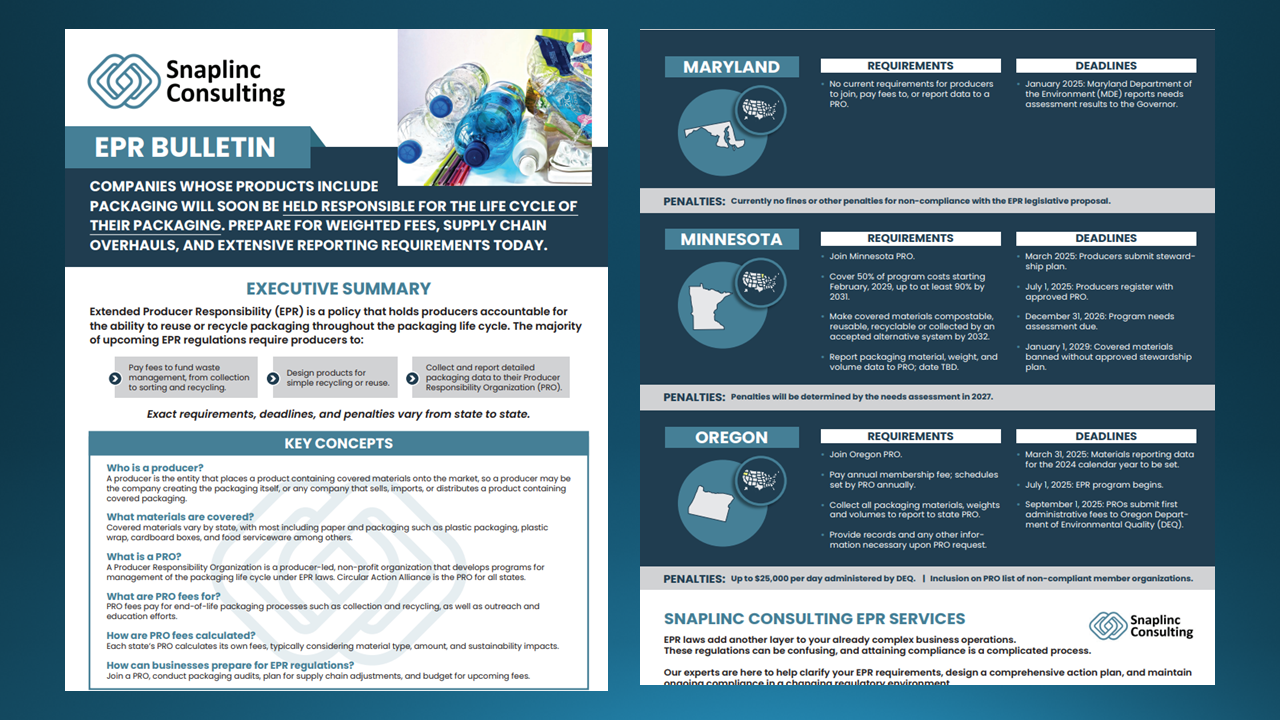Canada's New Plastics Reporting Regulations: What You Need to Know
Canada’s new environmental stewardship regulation, published under the Canadian Environmental Protection Act 1999 (CEPA), aims to create a comprehensive Federal Plastics Registry. This initiative mandates detailed reporting on plastic products starting in 2024Critical Update: With Phase 1 of plastics reporting due on September 29, 2025, Canada has released a guidance document that clarifies your reporting obligations. Read on for specific, updated information that will help your company stay in compliance.
Specific Reporting Requirements
Companies required to report to the Canada Plastics Registry in 2025 include producers, importers, and manufacturers of:
Plastic packaging
Electronic and electrical equipment (EEE)
Single-use or disposable products
If you produce any of these products that enter the residential waste stream, you’re obligated to report. Covered companies must report:
Plastic resin types used (e.g., PET, HDPE, PP, etc.), following North American Product Classification System (NAPCS) codes.
Resin sources (virgin fossil-based, post-consumer recycled, post-industrial recycled, or bio-based).
Quantity of plastics manufactured, imported, and placed on the market in Canada.
Approved methods used to determine plastic quantities include:
Specific Component Identification Method – precise weight analysis of plastic components.
Average Bill of Materials (ABOM) Method – estimating based on production data.
Fixed Factor Calculation Method – applying industry standard conversion factors.
Non-compliance penalties include fines up to $500,000 for corporations under section 272 of the Canadian Environmental Protection Act (CEPA).
Next Steps
Start gathering data on plastic usage and supply chain information now to meet the reporting deadline.
Consult your suppliers for resin compositions and packaging details.
More categories (e.g., agricultural plastics, textiles, construction materials) will be added in future phases (2026 & 2027).
As always, diligently review your obligations annually to stay aware of updates to reporting guidance and reach out to Snaplinc for answers to your critical questions.
1. Background
The new regulation will gather extensive data on plastic production, usage, and disposal in Canada, creating a database of information crucial for developing strategies to reduce plastic waste and enhance recycling efforts. By understanding the lifecycle of plastics from production to disposal, policymakers can create more effective environmental policies.
2. Who Is Affected?
Any person who produces, manufactures, imports, or places qualifying plastics on the market in Canada must report annually. Additionally, any person who generates packaging and plastic product waste at their industrial, commercial or institutional facility and all service providers for the management of qualifying plastics are required to report annual data. Exceptions exist for those manufacturing, managing, or producing under 1,000kg of plastic per year.
3. Deadlines
Affected companies must report comprehensive data annually. The data required for each subcategory of plastic varies by year, as a phased-in approach will be used.
2024 Data: Must be submitted by September 29, 2025.
2025 Data: Must be submitted by September 29, 2026.
2026 Data: Must be submitted by September 29, 2027.
2027 Data: Reporting requirements for 2027 and beyond will be announced in a future information-gathering notice.
The 2025 deadline requires reporting on packaging, single-use or disposable plastic products, and electronic and electrical equipment.
3. What Plastics are Affected?
The regulation covers a broad spectrum of plastic products, with additional categories and data collection required each year until 2027. Some categories of affected plastics include:
Textiles and apparel
Plastic resins
Packaging
Electronic and electrical equipment
Single-use or disposable plastic products
Agriculture and horticulture
Tires
Transportation
Construction
Fishing and aquaculture
Reporting phases based on category and year are delineated by the Government of Canada here.
4. Data to be Reported
Required information varies based on the entity’s relation to the plastics. Some reporting requirements include:
Type and source of plastics (listed by by resin, category and subcategory) used in manufacturing.
Quantities of plastics produced, collected, recycled, processed into chemicals, and sent to final disposal.
Methods used to determine these quantities.
5. How Snaplinc Can Help
Compliance is time-consuming and complicated; Snaplinc provides comprehensive compliance services to take the guesswork out of your sustainability strategy. Our team supports clients in:
Data Collection and Management: Gathering and organizing the necessary data on plastic resins and products.
Regulatory Compliance Audits: Conducting audits to ensure all data meets regulatory standards and requirements.
Training and Workshops: Educating internal teams on compliance processes and reporting protocols.
Reporting Assistance: Preparing and submitting accurate reports through the Environment and Climate Change Canada online portal.
Confidentiality Requests: Submission of confidentiality requests to maintain trade secret privacy.
Ongoing Support: Providing continuous guidance and updates as this regulation evolves and changes through 2027.
By leveraging these services, clients can ensure timely, accurate, and compliant reporting, mitigating the risk of financial or reputational penalties, all while developing a solid sustainability strategy.
6. How to Report Data
Submissions must be made through the designated online portal. Entities are required to maintain records of the submitted information, including calculations and measurements, for three years from the submission date. The Minister will make at least part of the collected information publicly available; confidentiality requests can be made if the information meets criteria in Section 52.
7. Conclusion
Non-compliance with these new reporting requirements will be penalized under the broader Canadian Environmental Protection Act, 1999. Entities involved in the production and management of plastics should prepare to comply with these new requirements, ensuring accurate and timely data submission to avoid penalties—and contribute to Canada's sustainability goals.



